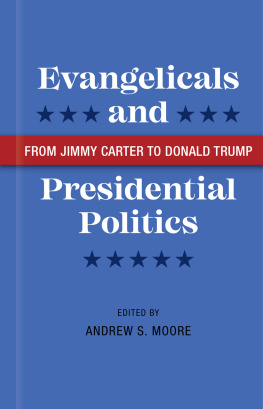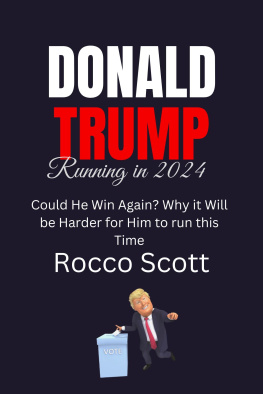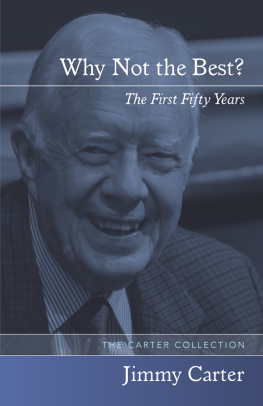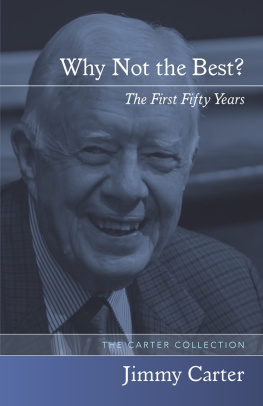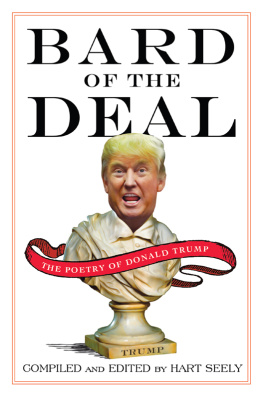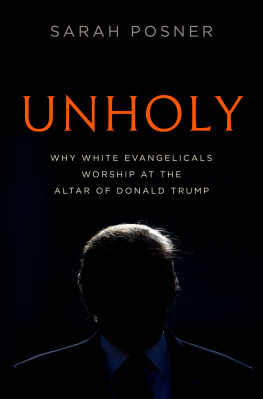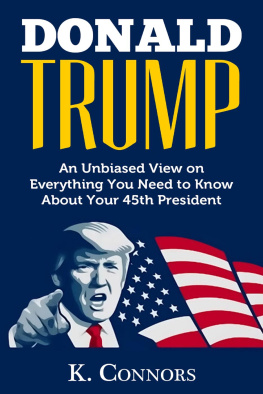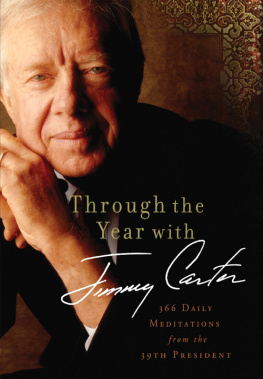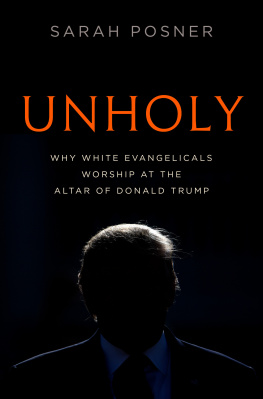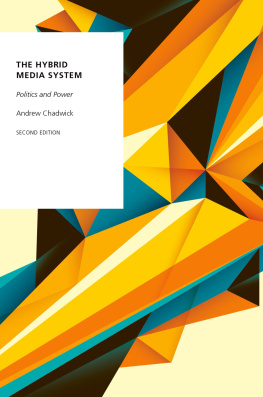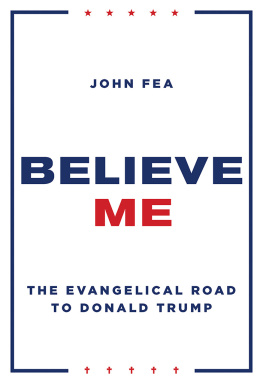Evangelicals
and
Presidential
Politics
Evangelicals
and
FROM JIMMY CARTER TO DONALD TRUMP
Presidential
Politics
EDITED BY
ANDREW S. MOORE

LOUISIANA STATE UNIVERSITY PRESS
BATON ROUGE
Published by Louisiana State University Press
www.lsupress.org
Copyright 2021 by Louisiana State University Press
All rights reserved. Except in the case of brief quotations used in articles or reviews, no part of this publication may be reproduced or transmitted in any format or by any means without written permission of Louisiana State University Press.
Designer: Laura Roubique Gleason
Typefaces: Garamond Premier Pro & Helvetica Neue, text; Mackay Bold, display
Library of Congress Cataloging-in-Publication Data
Names: Moore, Andrew S., 1968 editor.
Title: Evangelicals and presidential politics : from Jimmy Carter to Donald Trump / edited by Andrew S. Moore.
Description: Baton Rouge : Louisiana State University Press, 2021. | Includes index.
Identifiers: LCCN 2020021763 (print) | LCCN 2020021764 (ebook) | ISBN 978-0-8071-7434 -0 (cloth) | ISBN 978-0-8071-7485-2 (pdf) | ISBN 978-0-8071-7486-9 (epub)
Subjects: LCSH: EvangelicalismPolitical aspectsUnited States. | Religious rightUnited States. | Christian conservatismUnited States | Christianity and politicsUnited States. | PresidentsUnited StatesReligion. | United StatesPolitics and government19771981. | United StatesPolitics and government19811989. | United StatesPolitics and government1989
Classification: LCC BR1642.U5 E899 2021 (print) | LCC BR1642.U5 (ebook) | DDC 324.7/20973dc23
LC record available at https://lccn.loc.gov/2020021763
LC ebook record available at https://lccn.loc.gov/2020021764
Contents
ANDREW S. MOORE
RANDALL J. STEPHENS
RANDALL BALMER
DAN WELLS
ALLISON VANDER BROEK
DANIEL K. WILLIAMS
J. BROOKS FLIPPEN
JEFF FREDERICK
R. WARD HOLDER
HANNAH DICK
Acknowledgments
M ost of the essays in this book originated at a 2017 conference hosted by Saint Anselm College, entitled Jimmy Carter and the Year of the Evangelicals Reconsidered. The editor would like to thank everyone who participated in that conference. In addition to the authors whose essays appear here, Elizabeth Flowers, Hilde Lvdal Stephens, Ted Ownby, Jesse Curtis, Andrew Connolly, and Geoffrey Pollick offered up an interesting and wide range of perspectives on late-twentieth-century evangelicals and politics. Moreover, Kenneth Woodward, the Newsweek editor who wrote the original 1976 Year o f the Evangelicals cover story, delivered one of the conferences public lectures and was generous with his time and insights about the rise of political evangelicalism.
The conference was made possible through the financial support of the Henry Luce Foundation and the Office of the Vice President for Academic Affairs at Saint Anselm College, Brother Isaac Murphy, OSB. In addition, the Norwin S. and Elizabeth N. Bean Lecture Foundation, the New Hampshire Institute of Politics, and the Department of History and Department o f Politics at Saint Anselm College provided important financial support. William Ploog was instrumental in helping secure the Luce Foundation grant, and Laura Bellavia provided planning and logistical support that made the conference run smoothly.
Finally, the editor and authors wish to express their appreciation for the constructive criticism o f Louisiana State University Presss anonymous peer reviewer.
Evangelicals
and
Presidential
Politics
Introduction
JIMMY CARTER, THE YEAR OF THE EVANGELICALS, AND THE RELIGIOUS RIGHT
ANDREW S. MOORE
I n October 1976, Newsweek borrowed a phrase from pollster George Gallup and proclaimed that year the Year of the Evangelicals. This was noteworthy, according to some scholars, because for much of the twentieth century, since the 1920s, conservative Protestants had removed themselves from the public arenaor at least they had been selective in the causes they championed and the battles they joined. Instead, they concentrated on building their own subculture and largely left politics to others. That changed in 1976. The most prominent example of that turn was Democratic presidential candidate Jimmy Carter. The former governor of Georgia and self-described born-again Christian spoke openly about his faith and claimed that it influenced both his political decisions and his actions in daily life. Indeed, appearing two weeks before the presidential contest between Carter and incumbent Republican Gerald Ford, the cover story opened with a vignette from Plains Baptist Church, where Hugh Carterthe candidates cousinled a mens Bible study that included Jimmy, and the pastor, Bruce Edwards, prepared to preach a sermon about being born-again. Newsweek credited Carters candidacy with focusing national attention on the most significantand overlookedreligious phenomenon of the 1970s: the emergence of evangelical Christianity into a position of respect and power. Catholic writer Michael Novak described a hidden religious power base in American culture that secular journalists could not notice. Carter especially, according to Novak, had found it. Carter was the most prominent example o f this, but both presidential candidatesFord and Carter alikeclaimed to be born-again Christians, a claim made by one-third o f all Americans; significant proportions o f Protestants and Catholics told Gallups pollsters that the Bible should be taken literally, a marker of conservative evangelical Christianity. As Novak remarked, this phenomenon caught journalists by surprise, and they struggled to understand this new segment of the electorate.
JIMMY CARTER: A BRIEF HISTORY
Jimmy Carter was born in 1924 in Plains, Georgia (the first president born in a hospital), and he was a child when the Depression settled in, first in the South and then across the nation. His father was a large landowner, entrepreneur, and businessman, and the family survived the Depression in relatively good financial shape. Jimmy was not quite nine years old when Franklin Roosevelt became president, and he came of age at a time when the forces of economic depression combined with the political forces of the New Deal to introduce some fundamental changes to the Souths economy and (eventually) its social structure. Carters community was a biracial one, with his father the patriarch and labor lord over as many as 260 African Americans. Carters closest playmates were black, and he claimed never to see a color line. Nevertheless, race mattered in Carters South, and segregation remained intact well into his adult life. After graduation from the United States Naval Academy and a brief stint in the navy, Carter returned to Plains to take his fathers place as family patriarch and community leader.
Politics soon beckoned. Like his father before him, Jimmy served on the Sumter County School Board. Then, in 1962, without telling his wife, Rosalynn, he woke up one day and announced he was entering the race for state senate. The political landscape had shifted that year, after the United States Supreme Court forced Georgia to abandon its county unit system and redraw electoral districts for state elections. Despite flagrant voter fraud, he ultimately prevailed in that contest and then ran unopposed for reelection two years later. After a failed run for governor in 1966, in 1970 he used what many considered to be race-baiting tactics to defeat former governor Carl Sanders in a runoff. Despite playing both sides of the race issue in the campaign, he announced at his inauguration that the era of racial discrimination is over. While he did not prioritize civil rights for African Americans, he was true to his word. He appointed blacks to statewide positions, and he made the symbolic move of hanging Martin Luther King Jr.s portrait outside the Governors Office.


